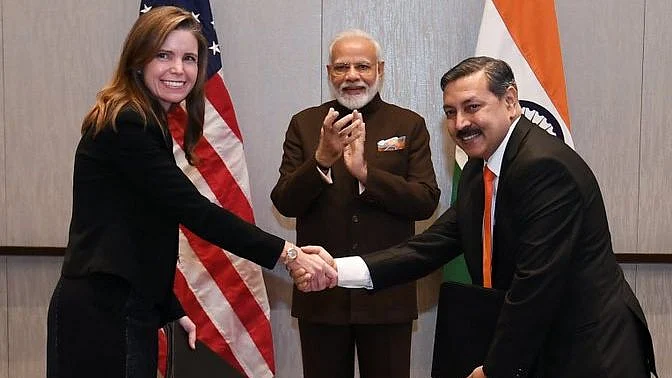The Memorandum of Understanding between Indian government’s Petronet and American gas company Tellurian is said to have been the biggest achievement of Prime Minister Narendra Modi’s recent visit to the United States.
The Quint had earlier reported that Tellurian was one of the major sponsors of PM Modi’s Howdy Modi event in Houston.
Under the agreement, Petronet will invest $2.5 billion or Rs 17,668 crore in Tellurian’s Driftwood LNG project in Louisiana. In return, Petronet and its affiliates can import upto five million tonnes per annum (MTPA) of liquefied natural gas (LNG) from the US.
This is still a Memorandum of Understanding, the deal is supposed to be finalised next year. However, questions have already emerged about the deal.
On Monday, Congress leader Jairam Ramesh tweeted, calling the deal “dubious”.
The MoU was signed on 21 September, which was a Saturday. But when markets opened on Monday, 23 September, Petronet’s stocks fell by 7 percent, which wasn’t a good sign for the company.
According to a report in The Hindu, Petronet’s officials, worried by the stock prices, had to hold a conference call for major investors to reassure them.
“Reasons for the board’s disquiet included major price drops in LNG, India’s demand shortfall, expected LNG supply from the Indian market and a negative experience with “locking in” contracts for a long period,” the report said.
A report by Press Trust of India on 24 September said that Petronet had actually disfavoured the deal with Tellurian during its board meeting in April-May this year. According to the report:
- The board members opposed locking imports for 40 years together with an equity investment in the LNG terminal.
- They felt that the company should not go ahead with the deal due to changing global gas market dynamics, where the fuel is available in abundance at rock bottom prices.
- Petronet's promoters, including state-owned gas utility GAIL India Ltd, refiner Indian Oil Corp (IOC) and Oil and Natural Gas Corp (ONGC), were all against the deal.
So what are the major concerns regarding the deal?
Capital Allocation
- Speaking to The Quint, several natural gas sector experts said that Petronet has taken a major investment risk. They say that while one can argue that this gas will be cheaper than existing deals with Russian or Australian companies, no one can guarantee that prices won’t go up.
- This reading of brokerage firms is unlikely to change till 2023-24 when the deal is executed.
- CITI’s brokerage report says that the investment of $2.5 billion could use up Free Cash Flow of five years for Petronet. In its assessment, CITI has moved Petronet “down the pecking order” among pure gas players due to cash concerns.
- Many analysts also say that the mega investment in Tellurian is also a departure from Petronet’s claim that it will be prudent in making large investments.
- In the liquefied natural gas (LNG) sector, Greenfield projects - such as Tellurian’s Driftwood LNG projects - are known to come with higher risks and greater costs as well.
- According to HSBC’s brokerage report, the higher risks involved could double the size of Petronet’s balance sheet.
- Experts also say that companies like GAIL would have been better considering their experience in pipelines, shipping etc.
- There are fears that Petronet’s balance sheet could suffer if doesn’t receive any help from affiliates.
Fall In Demand
According to most analysts, a major risk for Petronet is the possibility of a fall in demand for LNG in India. This could be due to change in seasonal prices or emergence of alternate sources of energy.
But the emergence of other sources of natural gas for India can have the same effect.
Emergence of Alternate Gas Sources
- The production target for the Krishna-Godavari gas basin is the end of 2019, so that will soon emerge as an important domestic source of natural gas in India.
- Petronet estimates that demand won’t be a problem for gas from the Driftwood project after its agreement with Qatar-based RasGas expires in 2028.
- Internationally, oversupply is a major problem that the natural gas sector is facing and this is the reason many experts caution against such large investments.
(At The Quint, we question everything. Play an active role in shaping our journalism by becoming a member today.)
